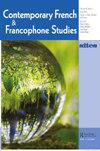非殖民化理论或共同敌人的发明
IF 0.2
4区 文学
0 LITERATURE, ROMANCE
引用次数: 0
摘要
在大西洋两岸,关于身份和种族的复杂问题的争论一直很激烈:取消文化、工作主义、批判种族理论、对平权行动政策的攻击,以及给学者贴上“伊斯兰左派”的标签。本文的重点是对一群好战的学者如何将“去殖民主义”的概念工具化,以及追随者如何将自己定位为自以为是的学术自由的假想捍卫者。在确定了主要的腐败影响源自美国之后,他们试图诋毁非殖民、后殖民和交叉研究方面的学术研究,并在这一过程中划定了一个共同的敌人。所发生的是一种针对学者的对抗,这些学者选择将法国共和党的理想置于更严格的审查之下,强调了世俗主义政策的缺陷,同时指出了法国例外论意识中根深蒂固的历史裂痕,还强调了法国在解决结构性种族主义和令人不安的伊斯兰恐惧症方面的无能。我们都知道,后殖民研究在国际上产生了相当大的影响,重新配置和重塑了智力辩论和制度框架,并刺激了广泛的跨学科研究。培养严谨的研究成果可以分享和讨论的空间,以及找到回归对话和交流的方式的重要性,无论如何强调都不为过,对话和交流是使法国享有声誉和自豪的传统的基本要素。本文章由计算机程序翻译,如有差异,请以英文原文为准。
Decolonial Theory or the Invention of a Common Enemy
Abstract On both sides of the Atlantic, polemics have been raging on complex questions relating to identity and race: cancel culture, wokism, critical race theory, assaults on affirmative action policies, and labeling scholars “Islamo-Leftists.” The focus of this article is provided by a closer examination of the ways in which a group of militant academics have instrumentalized the notion of “decolonialism” and how adherents have positioned themselves as the self-appointed imaginary defenders of academic freedom in research. Having identified the primary corrupting influence as originating in the United States, they have sought to discredit scholarship on decolonial, postcolonial, and intersectional studies, delineating in the process a common enemy. What transpires is an antagonism aimed at scholars who have elected to subject French Republican ideals to greater scrutiny, highlighted shortcomings in secularist policies while pointing to deep-seated historical fractures in the country’s sense of exceptionalism, and also underscoring France’s inability to address structural racism and disquieting forms of Islamophobia. We all know the considerable impact postcolonial studies have had internationally, reconfiguring and reshaping intellectual debates and institutional frameworks and stimulating broad interdisciplinary research. One cannot overstate the importance of fostering spaces in which rigorous research findings can be shared and discussed and of finding our way back to the kind of dialogue and exchanges that were foundational elements in a tradition that made France’s reputation and were a source of pride.
求助全文
通过发布文献求助,成功后即可免费获取论文全文。
去求助
来源期刊

Contemporary French and Francophone Studies
LITERATURE, ROMANCE-
CiteScore
0.30
自引率
0.00%
发文量
43
期刊介绍:
An established journal of reference inviting all critical approaches on the latest debates and issues in the field, Contemporary French & Francophone Studies (formerly known as SITES) provides a forum not only for academics, but for novelists, poets, artists, journalists, and filmmakers as well. In addition to its focus on French and Francophone studies, one of the journal"s primary objectives is to reflect the interdisciplinary direction taken by the field and by the humanities and the arts in general. CF&FS is published five times per year, with four issues devoted to particular themes, and a fifth issue, “The Open Issue” welcoming non-thematic contributions.
 求助内容:
求助内容: 应助结果提醒方式:
应助结果提醒方式:


